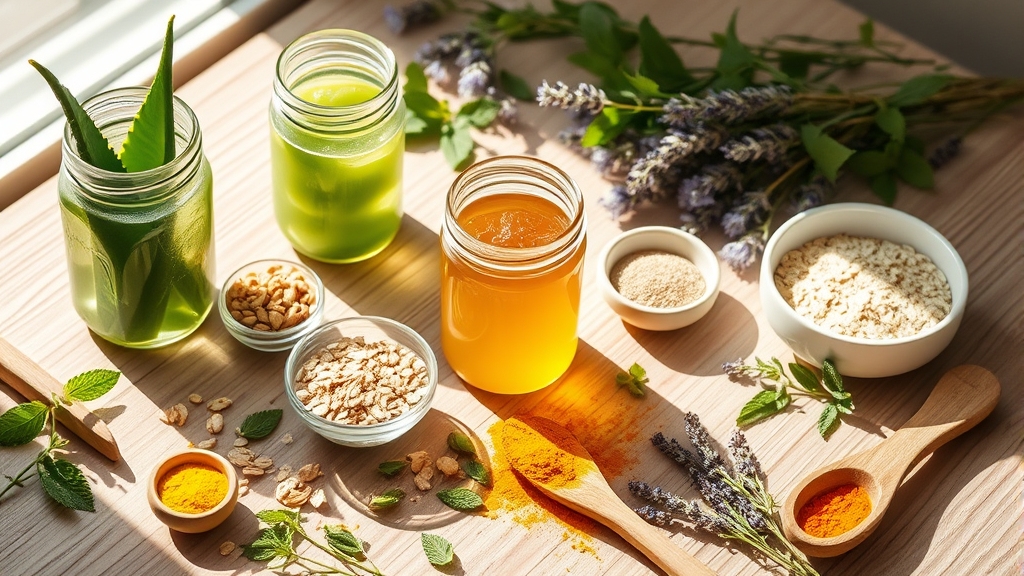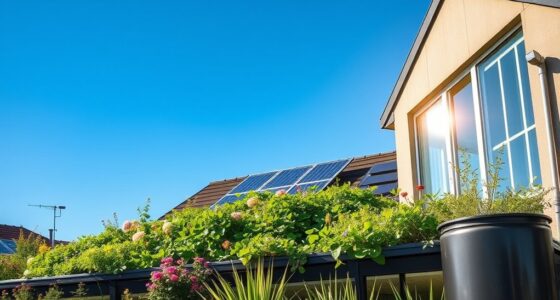Creating DIY natural beauty products allows you to choose eco-friendly, chemical-free ingredients that nourish your skin and reduce waste. By making herbal infusions with herbs like lavender or chamomile, you can extract beneficial properties for toners, masks, and serums. Sourcing ingredients locally or growing herbs at home guarantees quality and sustainability. Keep exploring to discover simple recipes and tips that make your self-care routine both effective and eco-conscious.
Key Takeaways
- Creating DIY natural beauty products ensures the use of pure, chemical-free ingredients for safer, healthier skincare.
- Selecting locally sourced and organic herbs reduces environmental impact and supports sustainable practices.
- Herbal infusions enhance product potency by extracting beneficial plant properties for nourishing skin treatments.
- Making products at home minimizes waste and packaging, promoting an eco-friendly self-care routine.
- DIY skincare empowers personalized, effective solutions that align with eco-conscious and self-sufficient lifestyles.

Ever wondered how to enhance your beauty routine with simple, natural ingredients? The secret lies in harnessing the power of herbal infusions and carefully managing ingredient sourcing. Creating your own skincare products not only guarantees you’re using pure, chemical-free ingredients but also reduces waste and supports a more eco-friendly lifestyle. Herbal infusions are a fantastic way to extract the beneficial properties from plants, allowing you to create potent, nourishing remedies right in your kitchen. To start, select herbs like chamomile, lavender, or rosemary, which are known for their soothing, anti-inflammatory, or invigorating effects. Steeping these herbs in a carrier like oil or water allows their active compounds to infuse thoroughly, resulting in versatile ingredients for toners, masks, or serums.
When sourcing ingredients, prioritize local or organic options whenever possible. This reduces your carbon footprint and guarantees you’re using high-quality, pesticide-free herbs and botanicals. You can grow your own herbs in a windowsill garden or purchase from farmers’ markets and trusted suppliers. Always check for fresh, vibrant herbs—dull or dried-out ones won’t produce the same potency. Proper ingredient sourcing is vital because it guarantees the safety and efficacy of your DIY products. Investing in good-quality herbs and oils means your homemade beauty treatments will deliver better results and be gentler on your skin.
Making herbal infusions at home is straightforward. For oil infusions, gently warm your dried herbs in a carrier oil like jojoba or sweet almond, then let them steep for several hours or days in a sealed jar in a sunny spot. Strain out the herbs afterward, and you’ll have a fragrant, nourishing oil ready to use in lotions or massage oils. Water-based infusions, such as herbal teas, can be cooled and used as toners or facial mists. These infusions preserve the herbal properties and add natural benefits to your skincare routine, all while avoiding synthetic preservatives.
Frequently Asked Questions
Are DIY Beauty Products Suitable for Sensitive Skin?
Are DIY beauty products suitable for sensitive skin? It depends on your ingredient sensitivities. You can create gentle formulations tailored to your needs, avoiding harsh chemicals. By choosing natural, soothing ingredients like aloe vera or chamomile, you minimize irritation. Always patch-test new recipes first. DIY products give you control over what you apply, making them a good option if you focus on gentle formulations designed for sensitive skin.
How Long Do Homemade Natural Products Last?
Think of homemade beauty products as delicate blooms—they won’t last forever. Your shelf life depends on ingredients and preservation methods, so store them in airtight containers and keep them in the fridge when possible. Typically, natural products last from a week to a month. Always check for signs of spoilage like changes in smell, color, or texture, and discard if anything seems off to keep your skin safe.
Can I Replace Store-Bought Ingredients With Substitutes?
You can often use ingredient substitutions in your homemade beauty products, but keep in mind that these changes may affect shelf life and effectiveness. Always research suitable substitutes to guarantee they’re safe and compatible with your recipes. Test small batches first, and note that some substitutes might shorten the shelf life or alter the results. Adjust storage and usage accordingly to maintain quality and safety in your DIY creations.
What Safety Precautions Should I Follow During DIY Projects?
Imagine your DIY project as a delicate dance—every move matters. You should wear gloves and work in a well-ventilated space to minimize risks. Always handle allergic reactions with care, keeping antihistamines nearby. Store your DIY products safely in labeled containers, out of reach of children. Keep your workspace clean and wash your hands afterward. These precautions help protect your skin, health, and the environment while you create your natural beauty remedies.
Are Homemade Products as Effective as Commercial Ones?
Homemade products can be just as effective as commercial ones if you choose the right ingredients and pay attention to ingredient preservation. While DIY options often cost less, they may lack preservatives, so proper storage is essential. You might need to experiment to find what works best for your skin. Overall, homemade beauty products offer personalized care, but their effectiveness depends on your recipes and how well you preserve their freshness.
Conclusion
By embracing DIY natural beauty products, you’re gently nurturing both yourself and the planet. Every small effort you make creates a ripple of positive change, even if it feels subtle at first. Remember, true beauty blooms from kindness and care—both for your skin and our environment. So, keep experimenting and trusting your instincts. In time, these mindful habits will quietly reveal their most radiant rewards, reminding you that simplicity often holds the greatest elegance.









